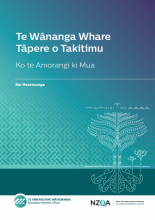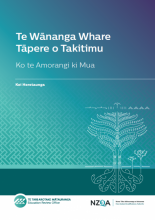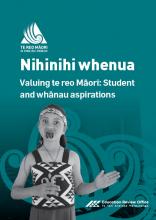- Topics: Enterprise learning, Evaluation, Much more than words: Manuka takoto kawea ake, New Zealand Curriculum, Programme for International Student Assessment (PISA), Te Marautanga o Aotearoa, Te Pou Mataaho | Evaluation and Research Māori
- Published: 10 May 2021
Exploring Collaboration in Action: Kahukura Community of Practice
ERO was approached by principals from Kahukura to document and evaluate their community of practice in Christchurch. This report identifies what is working well for this community of practice, areas where they might consider further enhancements, and lessons and insights into practices which could be shared with others.
- Published: 10 May 2021
Collaboration in Action: Lessons from a Community of Practice
This short report accompanies our report Exploring Collaboration in Action: Kahukura Community of Practice. It looks at the lessons that can be learnt from the Kahukura community of practice, drawing out key lessons on collaboration and providing seven key implications for schools who are interested in collaborating to consider.
- Published: 19 Jan 2021
Te Kahu Whakahaumaru – Ngā mahi a te rangai mātauranga Māori (English)
Te Pou Mataaho, ERO’s evaluation and research group, and Te Uepū ā Motu, ERO’s national evaluation and review team, pursued this evaluation to provide an evidence base about the initial impacts of Covid-19 on Māori-medium education and how the sector responded.
- Published: 19 Jan 2021
Te Kahu Whakahaumaru – Ngā mahi a te rangai mātauranga Māori (Māori)
I whāia tēnei arotake e Te Pou Mataaho, te rōpū arotake, rangahau hoki a Te Tari Arotake Mātauranga me Te Uepū ā-Motu, te rōpū arotake ā-motu a Te Tari Arotake Mātauranga, ki te whakaputa i tētahi kohinga taunakitanga e kitea ai ngā pānga tōmua o te Mate Korona ki te rāngai mātauranga reo Māori, me ngā rautaki i whāia ai e taua rāngai.
- Published: 10 Dec 2020
Te Kahu Whakahaumaru: Māori continue to show resilience across Māori-medium education
In Aotearoa, Māori-medium education experienced significant disruption when the outbreak of Covid-19 forced kura to close their doors, and whānau and kaiako to adjust to home schooling and distance learning. Among the many challenges were access to technology and resources with Māori communities among the most affected.
- Published: 10 Dec 2020
E whakatinana tonu nei te rāngai mātauranga reo Māori i te manawanui
I Aotearoa nei, i tino raru te rāngai mātauranga reo Māori i te horapatanga o te Mate Korona, i kati ai ngā tatau o ngā kura, i mate ai hoki ngā whānau me ngā kaiako ki te tīni i ā rātou mahi ki te whakaako ki te kāinga me te ako tawhiti.
Ko tētahi raru i roto i te huhua, ko te korenga o ngā taputapu matihiko me ngā rauemi, ka mutu ko ngā hapori Māori ērā i rongo i te korekore rawa atu nei.
- Published: 15 Sep 2020
Nihinihi Whenua – Valuing te reo Māori: Student and whānau aspirations
This report provides a snapshot of student and whānau perspectives on the teaching of te reo Māori. It follows the June publication of Te Tāmata Huaroa, which provides a review of the current status of te reo Māori in English medium school settings.
- Published: 19 Jun 2020
Overseas Trained Teachers: Adjusting to living and working in New Zealand
This report serves to shine some light on the experiences of teachers who have come from overseas to teach in New Zealand. It is based on data collected from a voluntary survey of teachers and principals of the school where they are employed.
- Published: 18 Jun 2020
Te Tāmata Huaroa: Te Reo Māori in English-medium Schooling
This report gives a snapshot of the current provision of te reo Māori teaching and learning in a representative sample of English-medium primary and secondary schools. The education sector is seen as an important lever in the Government’s Maihi Karauna strategy for language revitalisation.
- Published: 23 Jan 2020
On your marks ... get set... go! A tale of six schools and the digital technologies curriculum content
ERO conducted case studies of six schools’ implementation of the digital technologies curriculum content in Term 1, 2019. Schools that had successfully integrated the curriculum had leaders who promoted a growth mindset for teachers and looked to integrate digital technologies into existing curriculum. Timely professional development for teachers and positive community connections also enhanced schools’ ability to integrate the digital technologies curriculum.
- Published: 12 Dec 2019
Te Whāriki (2017): Awareness Towards Implementation
ERO’s final report in the Te Whāriki series summarises the findings of previous reports and includes the last two focus areas for the curriculum – how services decide ‘what learning matters here’ and how well they were developing learning-focused partnerships with parents and whānau.
- Published: 13 May 2019
Bullying Prevention and Response in New Zealand Schools May 2019
New Zealand schools have one of the highest rates of bullying among OECD member countries. In this evaluation, ERO looked at the extent to which schools were effectively working towards an environment in which students feel safe and free from bullying.
A companion report to this one, Bullying Prevention and Response: Student Voice focuses on ERO’s survey of students on their experience and understandings of bullying and effective bullying prevention and response.
- Published: 12 Sep 2018
Promoting wellbeing through sexuality education
This report provides findings from ERO's evaluation of how well schools were promoting and supporting student wellbeing through sexuality education.
It includes high-level findings, examples of good practice and recommendations for schools and policy audiences. It is accompanied by a series of short publications for whānau, students, and trustees.
Brochures aimed at students, whānau and Boards of Trustees are also available.
- Published: 14 May 2018
Teaching strategies that work - Reading
The Education Review Office (ERO) has released the latest in its Teaching Strategies that Work series. “Keeping children engaged and achieving in reading” is a description of strategies used by primary schools which have significantly improved their students’ achievement in reading.
- Published: 24 Apr 2018
Evaluation at a glance: A decade of assessment in New Zealand Primary Schools - Practice and trends
High quality assessment and evaluation allows us to focus on student progress and outcomes at classroom, school and system levels. It helps teachers, schools and systems to report on student achievement across points in time, and provide information for parents, trustees and the public about the quality of education.
- Published: 20 Feb 2018
Teaching strategies that work - Mathematics
This Education Review Office (ERO) report is one of a series of reports on teaching strategies that work. It features strategies and approaches that we observed in 40 primary schools selected from across New Zealand. These schools came from a database of 129 schools, all with rolls of 200 or more, in which the proportion of students in the upper primary years (Years 5 to 8) achieving at or above the national standard had increased. In each case achievement levels were also above average for the decile.
- Published: 24 Nov 2017
Teaching approaches and strategies that work
This evaluation looks at teaching approaches and strategies used in schools where there has been a significant increase in the number of students at or above National Standards in the upper primary school years (Years 5 to 8). We wanted to learn more about any short-term interventions or long-term strategies that may have been influential in bringing about these positive achievement trajectories. We have shared and discussed our findings from some of the 40 schools we visited.
- Published: 04 Sep 2017
Strengthening curriculum: inquiry maths
An analysis of achievement data and a desire to introduce more culturally responsive pedagogies into the classroom were triggers for introducing an inquiry -based approach to the teaching of mathematics at Manurewa Central School.












